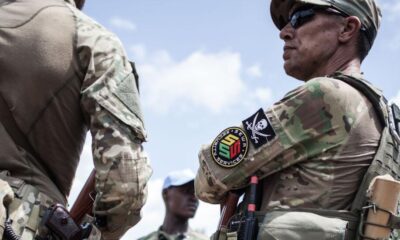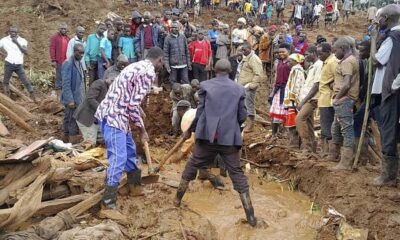Behind the News
Behind the News: All the backstory to our major news this week
Published
2 years agoon

Over the past one week, there were lots of important stories from around the African continent and we served you some of the most topical ones.
Here is a rundown of the backstory to some of the biggest news in Africa that we covered during the week:
1. Nigeria’s President Tinubu calls on citizens to make more sacrifices as fuel subsidy removal bites harder
On June 12, Nigeria’s President, Bola Tinubu called on citizens to make more sacrifices following the removal of fuel subsidy which has brought harder times on Nigerians with the attendant increase in fuel prices and the rising cost of living.
In his first Democracy Day speech, Tinubu who took the bold step to remove the subsidy which many Nigerians have said was only meant to enrich a few powerful individuals at the expense of the masses, said such sacrifices were meant for a better future.
“I have painfully asked you, my compatriots, to sacrifice a little more for the survival of our country. For your trust and faith in us, I assure you that your sacrifice will not be in vain.
“The government I lead will repay you with massive investments in transport infrastructure, education, regular electricity supply, healthcare and other public services,” he promised.
Successive administrations in Nigeria have lacked the political will to remove fuel subsidy while many political opponents, including Tinubu and immediate past president Muhammadu Buhari had kicked against its removal in 2012, and backed nationwide protests when then president Goodluck Jonathan attempted to remove it.
2. Nigerian Chef, Hilda Baci finally made it into the Guinness World Records
The week was a good one for Nigerians and Africans following the official confirmation of Nigerian Chef, Hilda Baci’s “Cook-a-Thon” record by the Guiness Book of Records for her efforts in the 100-hour non-stop cooking she achieved in May.
Though it took close to a month before the confirmation came, it was pleasant news when the GWR made the confirmation that the 27-year-old chef had beaten the previous record of 87 hours 45 minutes held by Indian chef, Lata Tondon, set in 2019, by more than five hours.
GWR had logged Baci’s record at 93 hours 11 minutes, docking her seven hours for taking a longer break than allowed on one occasion.
A statement by GWR on its Twitter handle had said:
“Following a thorough review of all the evidence, Guinness World Records can now confirm that Hilda Effiong Bassey, better known as Hilda Baci, has officially broken the record for the longest cooking marathon (individual), with a time of 93 hours 11 minutes.”
During the “Cook-a-Thon” which spanned four days, Baci cooked mostly Nigerian meals including the very popular jollof rice, as well as different types of rice and pasta, and also made akara which is a popular street food made from deep-fried mashed beans.
After the marathon cooking session, Baci spoke of her motivation:
“I just knew that I need to do something that is out of the ordinary to put myself on the map, to put Nigeria on the map, to put young African women on the map.”
3. African leaders stormed Kyiv to mediate in Russia/Ukraine war
On June 16, a delegation of African leaders led by President Cyril Ramaphosa of South Africa arrived in Kyiv, Ukraine to try and mediate in the war between Ukraine and Russia and find ways to broker peace.
Apart from Ramaphosa, the delegation had leaders and officials from Senegal, Zambia, and the Comoros Islands and was a follow-up to an earlier agreement between Russian President Vladimir Putin and his Ukrainian counterpart, Volodymyr Zelenskiy, who, on separate occasions and had agreed to meet a group of African leaders to discuss a potential peace plan for the conflict which has impacted the world especially Africa, in no small measure.
Zelenskiy himself had often called on world leaders to put more effort in mediating for peace in the war.
Zambian President, Hakainde Hichilema, who spoke to journalists on arrival, said Africa could not afford to “look away from the conflict.”
“Instability anywhere is instability everywhere. Life is universal, and we must protect lives – Ukrainian lives, Russian lives, global lives,” Hichilema said.
The war between the two countries was ignited when Russia invaded Ukraine in February 2022, and has gone on to have devastating effect on the world including food shortages and causing Europe’s largest refugee crisis since World War II with around 7.3 million Ukrainians fleeing the countr, while a third of its population has become internally displaced.
4. Ugandan govt officials slammed with visa restrictions by US over anti-gay law
On June 17, we brought you a report that the United States had imposed visa restrictions on Ugandan government officials following the passage of an anti-LGBTQ law by the country’s parliament.
The U.S. State Department, in a statement, said the visa restrictions were part of a wide range of sanctions planned for Ugandan officials following the passage of the Anti-Homosexuality Act signed into law by President Yoweri Museveni on May 29.
In a statement by State Department spokesperson, Matthew Miller, the U.S said the Ugandan officials were “individuals believed to be responsible for, or complicit in, undermining the democratic process in Uganda and specifically referenced human rights abuses against LGBTQ and intersex people and the Anti-Homosexuality Act.”
The Ugandan anti-gay law, which has been described by many western countries, international human rights groups and the United Nations as one of the harshest in the world, has a section that carries the death penalty for “aggravated homosexuality.”
President, Joe Biden, had, in wake of debate by the Ugandan parliament, threatened aid cuts and other sanctions.
In the same vein, Secretary of State, Antony Blinken, had warned that the government would consider visa restrictions against Ugandan officials if the bill was signed into law by Museveni.
5. Sad day in Uganda as jihadists attack school, kill 25
It was a sad day for Uganda and indeed Africa after rebels of the Allied Democratic Forces (ADF) attacked the Lhubirira Secondary School, located in the town of Mpondwe near the Congo DR border.
Though the initial casualty figure was put at 25, police say the number of students killed has risen to over 40 after the militants linked to ISIS reportedly slaughtered their victims before setting fire to their dormitory.
Uganda Police Force spokesperson, Fred Enanga, who confirmed the attack, said the terrorist group also looted the school’s food store before fleeing.
“A dormitory was burnt and a food store looted. So far, 25 bodies have been recovered from the school and transferred to Bwera Hospital. Eight others are also in critical condition,” Enanga wrote on Twitter.
Enanga however said Ugandan government troops had tracked the attackers into Congolese territory and were on their pursuit.
You may like
-


Russian Foreign Ministry claims cargo ship sinks in Mediterranean following explosion
-


Facebook returns to Uganda after 4-year ban
-


Court orders Uganda to compensate LRA war crimes victims
-


Mali rights group accuses Russian mercenaries of civilian atrocities
-


Ugandan football fan shot dead while celebrating Arsenal win over Man U
-


Death toll in deadly Uganda landslides rises to 20
Behind the News
Behind the News: All the backstories to our major news this week
Published
3 months agoon
October 18, 2024
Over the past week, many important stories from around the African continent were published, and we served you some of the most topical ones.
Here is a rundown of the backstories to some of the biggest news in Africa that we covered during the week:
Another look at Africa’s debt crisis
Conversations around Africa’s public debt were on the table during the week as Achim Steiner, administrator of the United Nations Development Programme, stated on Monday that the world’s poorest countries were unable to meet sustainable development targets because they had to prioritise debt payments over investments.
Addressing a gathering in Hamburg, Steiner asserted that the world financial crisis was impeding countries’ ability to accomplish the objectives, which include eradicating hunger and poverty, increasing access to healthcare and education, providing sustainable energy, and protecting biodiversity.
Since the COVID-19 pandemic’s pervasive effects on economies, the majority of the continent’s nations have suffered with both internal and international debt; yet, few have achieved much in the fight for debt restructuring under the G20 framework.
Numerous African nations, including Egypt, Tunisia, Nigeria, Ghana, Zambia, and others, are struggling with significant foreign debt. Together with Zambia and Ghana, Ethiopia will be a part of a thorough restructuring known as the “Common Framework.”
At the opening ceremony of the annual African Union summit in Ethiopia last year, UN Secretary-General Antonio Guterres made the case for changes to the international financial system’s structure to better meet the requirements of developing nations.
Africa’s whole external governmental debt as of 2021 was 726.55 billion USD. The amount of foreign public debt increased from 696.69 billion dollars in comparison to the previous year.
Concerns are being raised by the rising debt levels in Africa, which could not only hinder economic growth but also make repayment nearly difficult for many of these nations. This begs an important question: When does debt stop being beneficial and instead start to negatively impact a nation’s economic performance?
Kenya remains committed to Haiti, but what does it stand to gain?
Kenya will support an international anti-gang effort in Haiti next month by dispatching an additional 600 police officers there. Haiti’s prime minister was in Kenya to expedite the deployment of the military.
At least eleven countries have pledged to send more than 2,900 soldiers to participate in the Multinational Security Support (MSS), led by Kenya.
Kenya, whose participation in international peacekeeping missions is longstanding, declared earlier this year that it would be deploying 1,000 police personnel, citing as a starting point its assistance to a bordering country.
Approximately 600,000 individuals have been internally displaced due to gang conflict, and hundreds of thousands of aspiring migrants have been deported back to Haiti, where approximately 5 million people are facing extreme famine. October marks the end of the mission’s first 12-month term. As gang violence worsened in 2022, Haiti turned for the first time to foreign assistance.
Nevertheless, it failed to identify a leader prepared to assume the helm and numerous foreign governments were reluctant to back the unelected administration in the desperately poor nation.
Kenya gains significant political value by sending its troops to Haiti on the international scene. Kenya has gained international recognition as a trustworthy ally that is eager to assist other nations. The mission opens up various opportunities. Prior to deployment, Kenyan law enforcement forces will receive specialist training and equipment. In the long term, this will increase the force’s capacity. Of course, there are monetary rewards as the participating nations receive allocations of resources. Because troops will receive additional pay, officers are very interested in being deployed overseas.
Cameroon: ‘Healthy’ Biya remains out of sight
Cameroon’s president, Paul Biya can now be likened to the proverbial cat with nine lives as the 91-year-old has remained “healthy” following latest reports of his death during the week. Rumours have been circulating about Cameroonian President Paul Biya’s possible death in a military hospital in France due to his extended absence. This rumour stems from Biya’s prolonged absence following the September China-Africa Summit when he was anticipated to head back to Cameroon almost away.
As of November 6, 1982, Biya, who is 91 years old, has been in office for 42 years. He is the oldest head of state in Africa, the longest-lasting non-royal national leader worldwide, and the second-longest serving president overall. According to rumours, Biya’s oldest son Franck Emmanuel Biya may be named as his replacement for “continuity” in France.
Since its political independence from France and Britain in the early 1960s, Cameroon has only had two presidents. The country is currently dealing with two serious crises: a deadly Boko Haram insurgency in the north and a separatist conflict that has claimed thousands of lives.
President Biya is one of several long-serving African leaders, including Yoweri Museveni of Uganda, who has been in office since 1982, and Teodoro Obiang Nguema Mbasogo of Equatorial Guinea, Rwanda’s Paul Kagame is also gradually evolving into the group.
Things get tougher for embattled Kenyan Deputy President
During the week, the deputy president of Kenya was impeached by the National Assembly due to charges of corruption and abuse of power. In a vote held Tuesday night, lawmakers decisively decided to remove Rigathi Gachagua from office. The Senate will now decide what will happen to the deputy president.
Parliament adopted a proposal to remove Kenya’s deputy president from office, and on Wednesday, the matter was brought to the Senate for consideration. The National Assembly heard a nearly ninety-minute defence of troubled deputy president Rigathi Gachagua and his allies prior to the vote.
A surge of protests targeting President Ruto’s government has been occurring in Kenya over the last four months due to accusations of corruption made by certain lawmakers and government officials. High taxation and the parliament’s purported inability to act independently of the president were other issues that Kenyans objected to. Gachagua refutes the accusations made by certain lawmakers, who claim that the deputy president assisted in planning rallies against the government.
He supported Ruto in his election victory in 2022 and assisted in obtaining a sizable portion of the vote from the populated central Kenya region. Gachagua, however, has mentioned feeling marginalised in recent months, despite extensive claims in the local media that he and Ruto have strained political ties.
After widespread protests over unpopular tax increases in June and July that claimed more than 50 lives, Ruto sacked the majority of his cabinet and appointed members of the main opposition.
Gachagua infuriated many in Ruto’s coalition by comparing the government to a business and implying that people who supported the coalition had first claim to development projects and jobs in the public sector. Ruto has not yet publicly commented on the impeachment proceedings.
Behind the News
Behind the News: All the backstories to our major news this week
Published
4 months agoon
October 3, 2024
Over the past week, many important stories from around the African continent have been published, and we have served you some of the most topical ones.
Here is a rundown of the backstories of some of the biggest news in Africa that we covered during the week:
Musings on CBN rates across Africa: Ghana, Nigeria, and South Africa
During the week, many African countries announced monetary policy decisions. The Central Bank of Nigeria decided unanimously on Tuesday to raise its benchmark interest rate by an additional 50 basis points, to a new record high of 27.25%. This is the sixth hike in a row this year. The decision was made in an effort to reduce inflation, strengthen the naira, and draw in capital. Governor Olayemi Cardoso reaffirmed the bank’s commitment to controlling inflation and underlined how several rate hikes have contributed to its moderation.
Nigeria’s West Africa neighbour followed suit on Friday as the Bank of Ghana reduced its benchmark monetary policy rate by 200 points to 27% at a normal meeting. With inflation having slowed and disinflationary pressures mounting, this is the first decline in eight months and the steepest since March 2018. August 2024 saw a fifth consecutive month of decline in Ghana’s annual consumer inflation, which was still much higher than the central bank’s medium-term target range of 6% to 10%. The country’s annual inflation rate dropped to a nearly two-and-a-half-year low of 20.4% from 20.9% in July.
A week prior, as anticipated, the South African Reserve Bank decreased its benchmark interest rate by 25 basis points to 8% after holding seven consecutive meetings at a 15-year high of 8.25%. As price pressures decreased, the SARB is loosening policy for the first time since the epidemic in 2020
As monetary varying shifts across the continent continue, African nations are still facing numerous severe shocks and significant structural challenges, such as rising food and energy prices brought on by geopolitical tensions like Russia’s invasion of Ukraine, climate issues that impact agriculture and energy production, and ongoing political instability.
Africa’s real GDP growth slowed to 3.1% in 2023 from 4.1% in 2022 as a result of this difficult climate. With growth predicted to reach 3.7% in 2024 and 4.3% in 2025, the economic picture is projected to improve going ahead, underscoring the resilience of African countries.
Zambia and its post-drought plans
Zambia’s finance minister, Situmbeko Musokotwane stated on Friday that the nation intends to quickly recover from its worst drought in living memory and cut its budget deficit in half the following year.
The minister stated in a budget address that the copper producer hopes for a 6.6% growth in 2025, as opposed to a projected 2.3% increase in 2024. The country is aiming for a speedy recovery. as the government crop assessment data shows that over nine million people are affected in 84 of the 117 districts after suffering through the driest farming season in over forty years, which has led to considerable crop losses, an increase in livestock deaths, and worsening poverty,
Real GDP increased gradually between 2022 and 2023, from 5.2% to 5.8%. The supply side was driven by mining and quarrying, wholesale and retail commerce, and agriculture; the demand side was driven by consumer and business spending. Food prices, transit expenses, and the nominal exchange rate are the key drivers of inflation, which is expected to remain elevated and reach 11.0% and 10.9% at the end of 2022 and 2023, respectively.
The economic challenges faced by Zambia are exacerbated by the drought, especially when considering its debt load. Its debt restructuring talks under the G20 Common Framework have progressed far more slowly than was originally anticipated when the Common Framework was first proposed.
In 2017, Zambia was placed under debt distress, and as a result, non-concessional lending from multilateral development banks was discontinued. It’s possible that by overestimating sovereign risks, the main credit rating firms exacerbated the debt crisis and dealing with a post-drought crisis might just be another “too high hurdle”
As the World Bank and Uganda LGBTQ saga continues
The World Bank is taking more action in support of Uganda’s LGBTQ community. The global lender announced on Wednesday that it is implementing steps to guarantee that lenders to Uganda are not subjected to discrimination due to a severe anti-gay law. According to a World Bank representative, both new and continuing projects would be subject to the procedures, which also include an impartial monitoring system to guarantee compliance.
Same-sex partnerships are forbidden and punishable by life in prison; similarly, anyone convicted of “aggravated homosexuality” faces the death penalty. The Anti-Homosexuality Act (AHA) was passed by Uganda, a largely conservative nation, in May of last year and it has led to considerable Western censure and US penalties.
Other than Uganda, several African nations have strict laws that discriminate against individuals who identify as LGBTQ. Hakainde Hichilema, the president of Zambia, issued a warning in March to supporters of the LGBTQ movement to stop endorsing homosexuality. He also asked that Zambia “maintain laws that abhor alien orientations like gayism and lesbianism.”
South Africa, which has a constitution that forbids discrimination based on sexual orientation, was the first and only African nation to legalise same-sex marriage in 2006. Some African nations, such as Angola, Mozambique, Botswana, Lesotho, Mauritius, and Seychelles, have laws that are favourable to the continent’s population but Uganda appears to be unbothered or tempted despite the many causes and costs of its anti-gay stand.
Ahead of Tunisia’s presidential election
During the week, another Tunisian presidential candidate Ayachi Zammel was convicted and sentenced to six months imprisonment for using “fraudulent certificates” as opposition voices in the North African country continue on attack as President Saied positions himself for what is likely to be a reelection, as all but one of the opposition candidates are either incarcerated or have had their eligibility ruled invalid by the Tunisian electoral commission.
On September 19, a third candidate who had received the election commission’s approval was sentenced to 20 months in prison. Saied, who is currently running for reelection for a second five-year term, was originally elected in 2019 as an anti-establishment candidate who pledged to combat poverty and eradicate corruption. However, in 2021 he declared that he would rule by decree after overthrowing Mohamed Ennaceur and the elected parliament, a move denounced as a coup by the opposition and the international community.
Additionally, he has deployed more oppressive strategies, which may indicate that he is not confident in his ability to win with conviction. His severe actions could indicate a new stage in Tunisia’s democratic backsliding and foreshadow more crackdowns and turmoil during an inevitable second term.
Meanwhile, concerns exist over potential voting turnout as well. Under Saied, Tunisia has conducted three elections, with dismal voter turnout in each. Less than one-third of voters cast ballots in favour of a new constitution that solidified Saied’s power and overthrew the 2014 charter in July 2022. After Saied dismissed the previous legislature in December 2022, only 11% of voters cast ballots for new members of parliament, which is among the lowest turnout percentages ever recorded in a national election worldwide. The next December, Saied called elections for a new second house of parliament, repeating this dubious performance.
EDITOR’S PICK


Nigeria: Marketers predict further price cut as another refinery begins operations
Oil marketers and the Nigerian Midstream and Downstream Petroleum Regulatory Authority expect refined petroleum product prices to reduce as another...


Kenya: Consumer inflation rises to 3.0% from 2.8%
Kenya’s statistics agency said on Tuesday that Kenya’s consumer price inflation increased slightly to 3.0% year-over-year in December from 2.8%...


South Africa’s Transnet’s half-year deficit hits $117m
Transnet, a state-owned logistics company in South Africa, announced on Tuesday that it had lost 2.2 billion rand ($117.48 million)...


Nigeria, China extend $2bn currency swap deal
A 15 billion yuan ($2 billion) currency-swap arrangement between China and Nigeria has been extended to boost investment and commerce...


Egypt’s central bank maintains overnight rates
As anticipated, Egypt’s central bank has maintained its overnight interest rates, stating that although inflation was predicted to drop significantly...


Illicit flows cost Nigeria, others $1.6bn daily— AfDB
According to the African Development Bank (AfDB), illicit money flows and profit shifting by multinational corporations doing business in Africa...


‘Don’t start what you can’t finish’, ex-Nigerian official replies President Tchiani
Former Nigerian Aviation Minister, Femi Fani-Kayode, has told President Abdourahamane Tchiani of Niger Republic to refrain from making infantile and...


Again, Starlink raises prices of its services in Nigeria
Elon Musk’s satellite internet service provider, Starlink, has again jacked up the prices of its services in Nigeria after an...


Former President of Moroccan club Raja sentenced to 3 years in prison
The former President of Moroccan top club, Raja Casablanca, Mohamed Aouzal, has been sentenced to three and a half years...


Zambia announces second case of Mpox as country battles cholera outbreak
The Zambian Ministry of Health has reported a second case of Monkeypox, popularly known as Mpox, in Kitwe region of...


